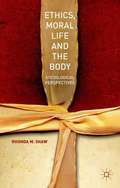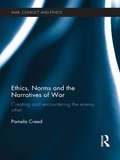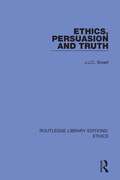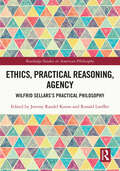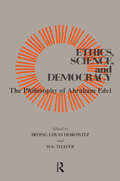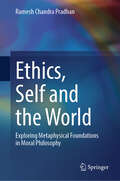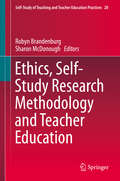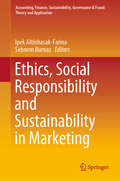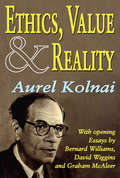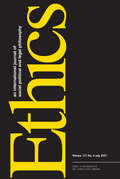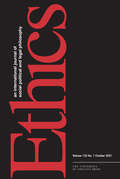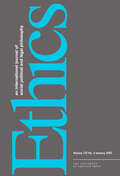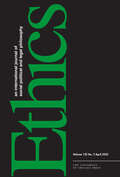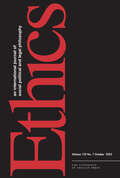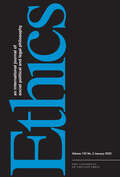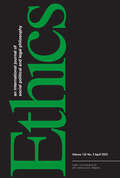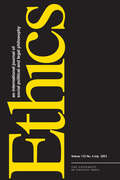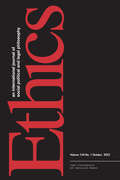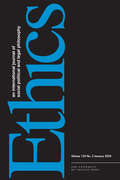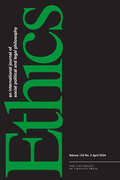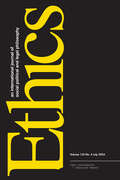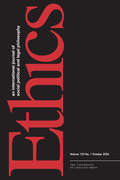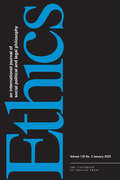- Table View
- List View
Ethics, Money and Sport: This Sporting Mammon (Ethics and Sport)
by Richard Giulianotti Adrian WalshWritten from the contrasting yet complementary perspectives of sociology and philosophy, this book explores the far-reaching ethical consequences of the runaway commodification of sport, focusing on those instances where commodification gives rise to morally undesirable consequences. The authors consider three main areas of concern for participators and observers alike: the corrosion of the core meanings and values of sport, the increasing elitism of access to sporting commodities, and the undermining of social conditions that support sporting communities. Unique in its focus on the ethical dimension of the powerful economics of today’s sport, this book will be of interest, not only to those in the fields of sports studies and ethics of sport, but also to academics, researchers and students in philosophy of morality, sociology, and the ethics of globalization as viewed through the ultimate globalized phenomenon of modern sport.
Ethics, Moral Life and the Body: Sociological Perspectives
by Rhonda ShawShaw addresses the 'ethical turn' in contemporary sociological thinking, by exploring the contribution of sociology and the social sciences to bioethical debates about morality and tissue exchange practices.
Ethics, Norms and the Narratives of War: Creating and Encountering the Enemy Other (War, Conflict and Ethics)
by Pamela CreedThis book examines the ethics and values that render a war discourse normative, and features the stories of American soldiers who fought in the Iraq War to show how this narrative can change. The invasion of Iraq, launched in March 2003, was led by the United States under the now discredited claim that Iraq was developing weapons of mass destruction (WMD). However, critical questions concerning what we may be able to learn from this experience remain largely unexplored. The focus of this book, therefore, is on soldiers as systems of war – and the internal battle many of them wage as they live a reality that slowly emerges as inconsistent with familiar beliefs and value commitments. This work offers a reflective study of identity struggle from the perspective of emotional psychology and delves into the ‘narrative field’ of socio-politics. Going beyond the political contestations over the U.S. military intervention in Iraq, the author analyses original research on the evolving beliefs and value-commitments of veterans of the war, exploring their faith in its ‘just cause’ and their personal sense of self and national identity. This book will be of much interest to students of the Iraq War, US foreign policy, military studies, discourse analysis, and IR in general.
Ethics, Persuasion and Truth
by J. J. SmartOriginally published in 1984, deals with meta-ethics – that is the semantics and pragmatics of ethical language. This book eschews the notions of meaning and analyticity on which meta-ethics normally depends. It discusses questions of free will and responsibility and the relations between ethics on the one hand and science and metaphysics on the other. The author regards ethics as concerned with deciding what to do and with persuading others – not with exploring a supposed realm of ethical fact.
Ethics, Practical Reasoning, Agency: Wilfrid Sellars’s Practical Philosophy (Routledge Studies in American Philosophy)
by Jeremy Randel Koons Ronald LoefflerThis is the first volume devoted exclusively to the practical philosophy of Wilfrid Sellars. It features original essays by leading Sellars scholars that examine his ethical theory, his theory of practical reasoning, and his theory of intentional agency. While most scholarship on Sellars’s philosophy has focused on his epistemology, metaphysics, or philosophy of language and mind, Sellars himself regarded his practical philosophy as central to his overall project of situating rational beings within the natural order. The chapters in this volume address this neglected area of Sellars’s philosophy. The chapters are divided into thematic sections covering Sellars’s theory of we-intentions – influential in contemporary debates on collective intentionality – naturalism and the manifest image, and the moral point of view. Together, they demonstrate how Sellars’s practical philosophy contributes to important debates in contemporary philosophy regarding, for example, expressivist approaches to moral thought and group agency in the collective intentionality literature. Ethics, Practical Reasoning, Agency: Wilfrid Sellars’s Practical Philosophy will appeal to scholars and advanced students interested in Wilfrid Sellars, American philosophy, and ethics.
Ethics, Science, and Democracy: Philosophy of Abraham Edel
by Irving Louis Horowitz H. S. ThayerThis volume, modeled after those published in The Library of Living Philosophers, attempts to provide a coherent statement of the work of Abraham Edel in moral and political theory, and on the impact of his work on such diverse areas as education, law, and social science.
Ethics, Self and the World: Exploring Metaphysical Foundations in Moral Philosophy
by Ramesh Chandra PradhanThis book delves into the profound question of whether moral philosophy rests upon metaphysical foundations. Contrary to the assertions of moral relativists such as John Mackie and Bernard Williams, who contend that ethics is devoid of metaphysical grounding, this work challenges their claims. Designed for those who approach morality and view ethics as a subject firmly anchored in metaphysics, this book is an essential exploration. It delves into the metaphysical underpinnings of morality, examining the source of morality in the metaphysical self, the intricate relations between ethics, self and the world and the interplay between ethics and metaphysics. It tackles fundamental questions, such as why freedom is the foundational postulate of morality and why, akin to Kant, we must acknowledge the importance of moral law. Furthermore, the chapters explore the nature of values and their metaphysical standing, the practical application of morality in the real world, the essence of virtues as attributes of the human soul, the interconnectedness of morality with rationality and spirituality and the challenges ethics faces from relativism and naturalism. The book appeals to moral philosophy researchers and students interested in unraveling morality's metaphysical roots. It offers an investigative exploration of the intricacies surrounding the problems of morality.
Ethics, Self-Study Research Methodology and Teacher Education (Self-Study of Teaching and Teacher Education Practices #20)
by Robyn Brandenburg Sharon McDonoughThis book examines the nuanced and situated experiences of self-study researchers. It explores the ways in which ethics are dynamic, idiosyncratic and require an ongoing ethical reflexivity. In addition, the book identifies, documents and collates the collective experiences of self-study researchers and sheds new light on the role and impact of ethics, ethical dilemmas and ensuing decisions for education researchers.The book considers the ethical dilemmas that self-study researchers in teacher education face, their careful ethical considerations while conducting research, and how they form their professional judgment and understanding of what it means to be an ethical self-study researcher. For self-study researchers, there are a number of ethical dilemmas and challenges that cannot be neatly captured by the frameworks and guidelines of an ethics board. For many, this requires researchers to be ever-present and re-engaged with the ethics of their own projects, from the development, through to the dissemination of their work.Readers will gain a deeper understanding of ethics, ethical perspectives and practices in the field of self-study research.
Ethics, Social Responsibility and Sustainability in Marketing (Accounting, Finance, Sustainability, Governance & Fraud: Theory and Application)
by Ipek Altinbasak-Farina Sebnem BurnazThis book addresses the rising concept of 21st century societal marketing which entails that marketers should fulfill the needs of their target group in ways that enhance the well-being of a society as a whole. In the past, social responsibility and corporate ethics may not have been the key elements of corporate and business strategy. However, in the last decade the picture has changed dramatically. Consumers are more concerned about ethical issues and the effects of business activities on the environment and the society. The impact and importance of ethical consumerism is escalating. The consumers are more attentive and expect companies promote their ethical credentials in order to make them more accountable of their actions. This book also reveals how companies should realize that corporate social responsibility (CSR) is not an illustration of corporate altruism but a source of opportunity, and competitive advantage. Finding and following social initiatives as a part of the key business model is proved to be one of the competitive strengths in many instances. This book covers different issues related to ethics, social responsibility and sustainability in marketing and presents different cases and applications from different countries. Together with the best practices, each case and research is expected to shed light on how to improve the role of marketing in helping to the development and well-being of the society.
Ethics, Society and Politics: Themes from the Philosophy of Peter Winch (Nordic Wittgenstein Studies #6)
by Michael Campbell Lynette ReidThis volume is a reappraisal of the work of Peter Guy Winch (1926 -1997), one of the most important philosophers of the 20th Century. Winch faded into relative obscurity compared to his contemporaries due to a mistaken belief that there are no systematic connections between the different aspects of his work. This volume corrects that presupposition and reintroduces Winch's work to a new generation of scholars. By showing how ethical, political and social issues are interrelated in Winch's work, and by making clear the connections between these issues and themes in metaphysics and the philosophy of mind, the volume demonstrates both the breadth and the unity of Winch's approach. It discusses topics such as ethics, political philosophy, social science, the philosophy of action, the philosophy of mind, metaphysics, and the philosophy of language. Despite this apparent variety of topics, the contributors to the volume share Winch's conviction that the different areas of philosophy are interdependent. As a result, the volume as a whole shows unity in diversity and provides an example of a manner of philosophising in which different approaches and sub-disciplines are placed in dialogue with each other. Peter Guy Winch is most famous for his early work on the philosophy of the social sciences. His On the Idea of a Social Science and its Relation to Philosophy (ISS) generated controversy within both philosophical and social scientific circles. In that work and subsequent publications Winch argued against the presupposition that social relations could be understood using the conceptual tools of the natural sciences. Winch would later describe ISS as a 'young man's book' and would come to regret the reputation it garnered him - a mixture of roughly equal degrees fame and infamy. Alongside his work on the philosophy of social sciences, Winch was an interpreter and exegete of Wittgenstein. He also published a ground-breaking study of the philosophy of Simone Weil, entitled Simone Weil: The Just Balance. Winch also published numerous essays on issues in ethics, political philosophy and the philosophy of religion, and at his death was working on a book manuscript on the problem of political authority.
Ethics, Value, and Reality: Selected Papers Of Aurel Kolnai
by Aurel KolnaiEthics, Value, and Reality is a collection of essays written after Kolnai settled in England in 1955. These essays from Kolnai's mature years sit atop a remarkable gestation of moral and political thinking. At the heart of his thought is the special role of privilege in a good social order. Kolnai relies heavily on the work of late nineteenth- and early twentieth-century value theorists such as Alexius Meinong, Nicolai Hartmann, and Max Scheler. He blends this continental tradition of ethics with British intuitionism and Scottish Enlightenment articulations.For Kolnai, ethical life cannot be adequately understood except by reference to moral emphasis, and thus, Kolnai can be thought of as a liberal conservative. He acknowledges myriad values, moral and non-moral, and accepts that all can have some claim upon us. Low values as much as high values have a legitimate claim. His is a tolerant conservatism though not for a moment does he forgo the necessity of judgment: a readily graspable hierarchy keeps the respective demands of values in proportion. Kolnai welcomes the call to seriousness, which is the hallmark of existentialism.The ground of Kolnai's thought is the idea of emotion as cognitive. He saw the typical analytical philosopher's fascination with simplicity of explanation not only thoroughly refuted by the gains in understanding wrought by phenomenological method, with its deference to the richness of phenomena, but sensed in the monistic inclination he dreaded a harbinger of totalitarianism. Never denying his emotionalism, he nonetheless made his points well enough by adopting an analytical approach to philosophy and ethics. This is a major work crossing moral and political philosophy.
Ethics, volume 131 number 4 (July 2021)
by EthicsThis is volume 131 issue 4 of Ethics. Ethics features scholarly work that covers a range of topics pertaining to moral, political, and legal philosophy from a variety of intellectual perspectives, including social and political theory, law, and economics. Articles in the journal present new theories, apply theory to contemporary moral issues, and focus on historical works that have significant implications for contemporary theory. In addition to major articles, Ethics publishes critical discussions, symposia, review essays, and book reviews.
Ethics, volume 132 number 1 (October 2021)
by EthicsThis is volume 132 issue 1 of Ethics. Ethics features scholarly work that covers a range of topics pertaining to moral, political, and legal philosophy from a variety of intellectual perspectives, including social and political theory, law, and economics. Articles in the journal present new theories, apply theory to contemporary moral issues, and focus on historical works that have significant implications for contemporary theory. In addition to major articles, Ethics publishes critical discussions, symposia, review essays, and book reviews.
Ethics, volume 132 number 2 (January 2022)
by EthicsThis is volume 132 issue 2 of Ethics. Ethics features scholarly work that covers a range of topics pertaining to moral, political, and legal philosophy from a variety of intellectual perspectives, including social and political theory, law, and economics. Articles in the journal present new theories, apply theory to contemporary moral issues, and focus on historical works that have significant implications for contemporary theory. In addition to major articles, Ethics publishes critical discussions, symposia, review essays, and book reviews.
Ethics, volume 132 number 3 (April 2022)
by EthicsThis is volume 132 issue 3 of Ethics. Ethics features scholarly work that covers a range of topics pertaining to moral, political, and legal philosophy from a variety of intellectual perspectives, including social and political theory, law, and economics. Articles in the journal present new theories, apply theory to contemporary moral issues, and focus on historical works that have significant implications for contemporary theory. In addition to major articles, Ethics publishes critical discussions, symposia, review essays, and book reviews.
Ethics, volume 133 number 1 (October 2022)
by EthicsThis is volume 133 issue 1 of Ethics. Ethics features scholarly work that covers a range of topics pertaining to moral, political, and legal philosophy from a variety of intellectual perspectives, including social and political theory, law, and economics. Articles in the journal present new theories, apply theory to contemporary moral issues, and focus on historical works that have significant implications for contemporary theory. In addition to major articles, Ethics publishes critical discussions, symposia, review essays, and book reviews.
Ethics, volume 133 number 2 (January 2023)
by EthicsThis is volume 133 issue 2 of Ethics. Ethics features scholarly work that covers a range of topics pertaining to moral, political, and legal philosophy from a variety of intellectual perspectives, including social and political theory, law, and economics. Articles in the journal present new theories, apply theory to contemporary moral issues, and focus on historical works that have significant implications for contemporary theory. In addition to major articles, Ethics publishes critical discussions, symposia, review essays, and book reviews.
Ethics, volume 133 number 3 (April 2023)
by EthicsThis is volume 133 issue 3 of Ethics. Ethics features scholarly work that covers a range of topics pertaining to moral, political, and legal philosophy from a variety of intellectual perspectives, including social and political theory, law, and economics. Articles in the journal present new theories, apply theory to contemporary moral issues, and focus on historical works that have significant implications for contemporary theory. In addition to major articles, Ethics publishes critical discussions, symposia, review essays, and book reviews.
Ethics, volume 133 number 4 (July 2023)
by EthicsThis is volume 133 issue 4 of Ethics. Ethics features scholarly work that covers a range of topics pertaining to moral, political, and legal philosophy from a variety of intellectual perspectives, including social and political theory, law, and economics. Articles in the journal present new theories, apply theory to contemporary moral issues, and focus on historical works that have significant implications for contemporary theory. In addition to major articles, Ethics publishes critical discussions, symposia, review essays, and book reviews.
Ethics, volume 134 number 1 (October 2023)
by EthicsThis is volume 134 issue 1 of Ethics. Ethics features scholarly work that covers a range of topics pertaining to moral, political, and legal philosophy from a variety of intellectual perspectives, including social and political theory, law, and economics. Articles in the journal present new theories, apply theory to contemporary moral issues, and focus on historical works that have significant implications for contemporary theory. In addition to major articles, Ethics publishes critical discussions, symposia, review essays, and book reviews.
Ethics, volume 134 number 2 (January 2024)
by EthicsThis is volume 134 issue 2 of Ethics. Ethics features scholarly work that covers a range of topics pertaining to moral, political, and legal philosophy from a variety of intellectual perspectives, including social and political theory, law, and economics. Articles in the journal present new theories, apply theory to contemporary moral issues, and focus on historical works that have significant implications for contemporary theory. In addition to major articles, Ethics publishes critical discussions, symposia, review essays, and book reviews.
Ethics, volume 134 number 3 (April 2024)
by EthicsThis is volume 134 issue 3 of Ethics. Ethics features scholarly work that covers a range of topics pertaining to moral, political, and legal philosophy from a variety of intellectual perspectives, including social and political theory, law, and economics. Articles in the journal present new theories, apply theory to contemporary moral issues, and focus on historical works that have significant implications for contemporary theory. In addition to major articles, Ethics publishes critical discussions, symposia, review essays, and book reviews.
Ethics, volume 134 number 4 (July 2024)
by EthicsThis is volume 134 issue 4 of Ethics. Ethics features scholarly work that covers a range of topics pertaining to moral, political, and legal philosophy from a variety of intellectual perspectives, including social and political theory, law, and economics. Articles in the journal present new theories, apply theory to contemporary moral issues, and focus on historical works that have significant implications for contemporary theory. In addition to major articles, Ethics publishes critical discussions, symposia, review essays, and book reviews.
Ethics, volume 135 number 1 (October 2024)
by EthicsThis is volume 135 issue 1 of Ethics. Ethics features scholarly work that covers a range of topics pertaining to moral, political, and legal philosophy from a variety of intellectual perspectives, including social and political theory, law, and economics. Articles in the journal present new theories, apply theory to contemporary moral issues, and focus on historical works that have significant implications for contemporary theory. In addition to major articles, Ethics publishes critical discussions, symposia, review essays, and book reviews.
Ethics, volume 135 number 2 (January 2025)
by EthicsThis is volume 135 issue 2 of Ethics. Ethics features scholarly work that covers a range of topics pertaining to moral, political, and legal philosophy from a variety of intellectual perspectives, including social and political theory, law, and economics. Articles in the journal present new theories, apply theory to contemporary moral issues, and focus on historical works that have significant implications for contemporary theory. In addition to major articles, Ethics publishes critical discussions, symposia, review essays, and book reviews.

